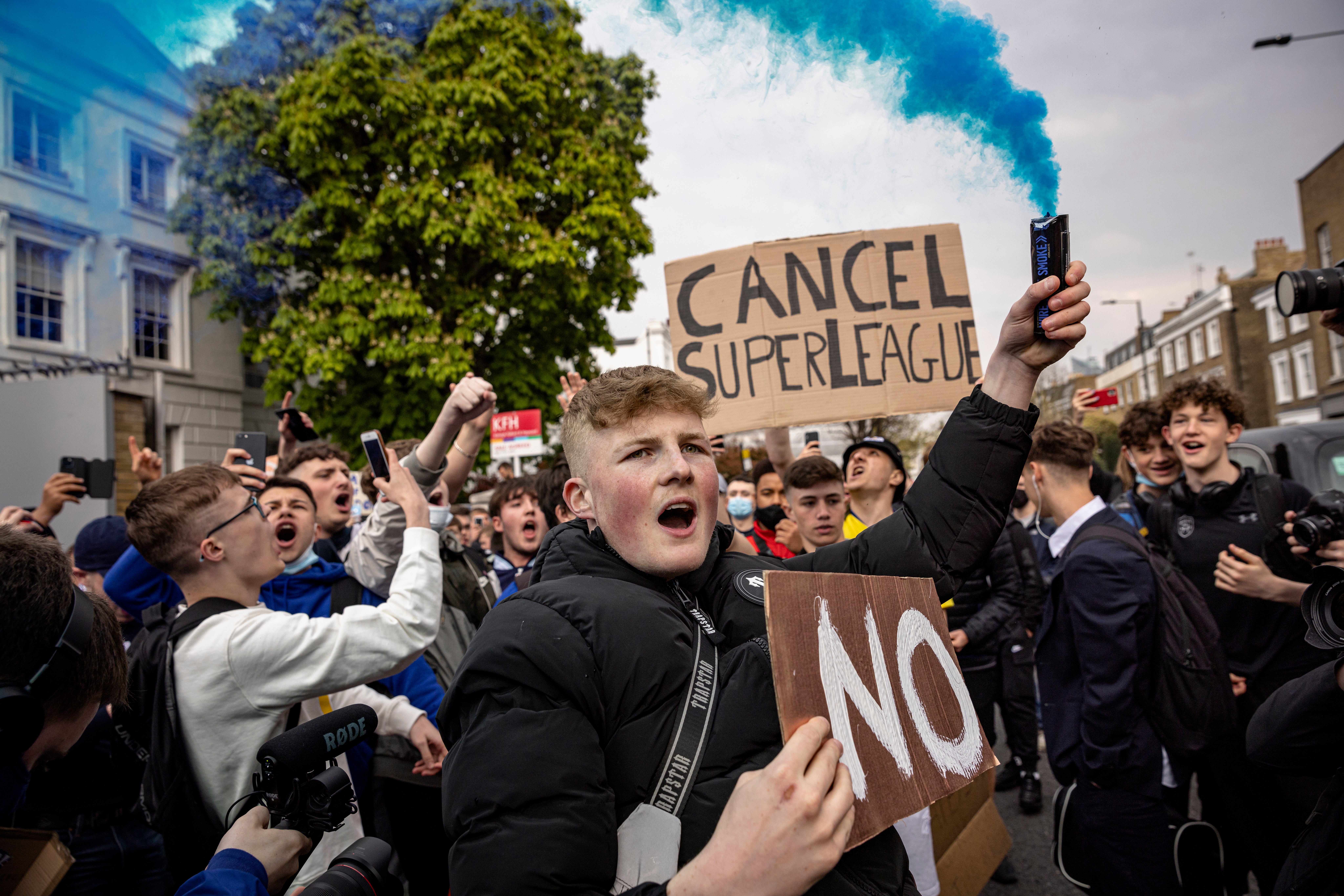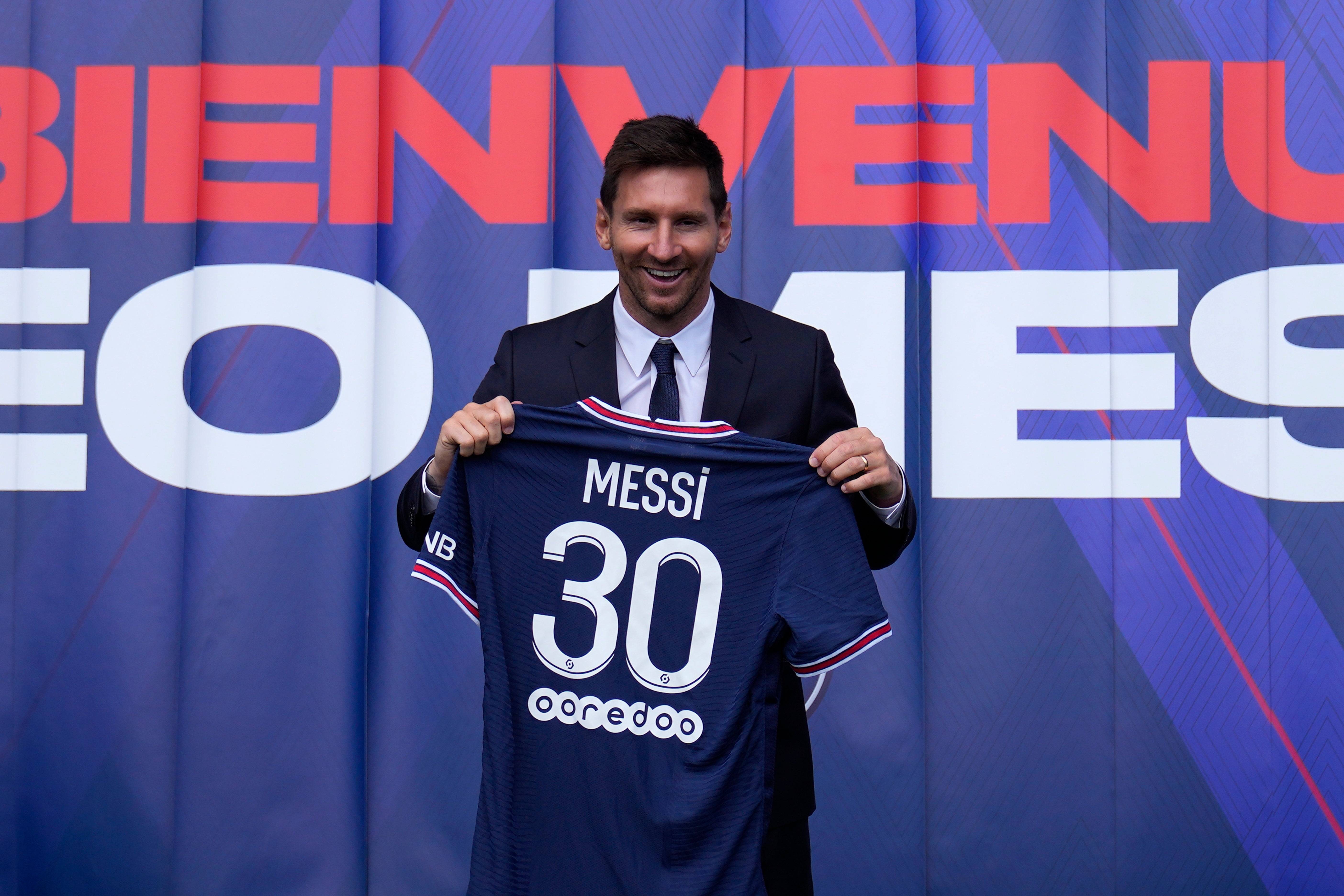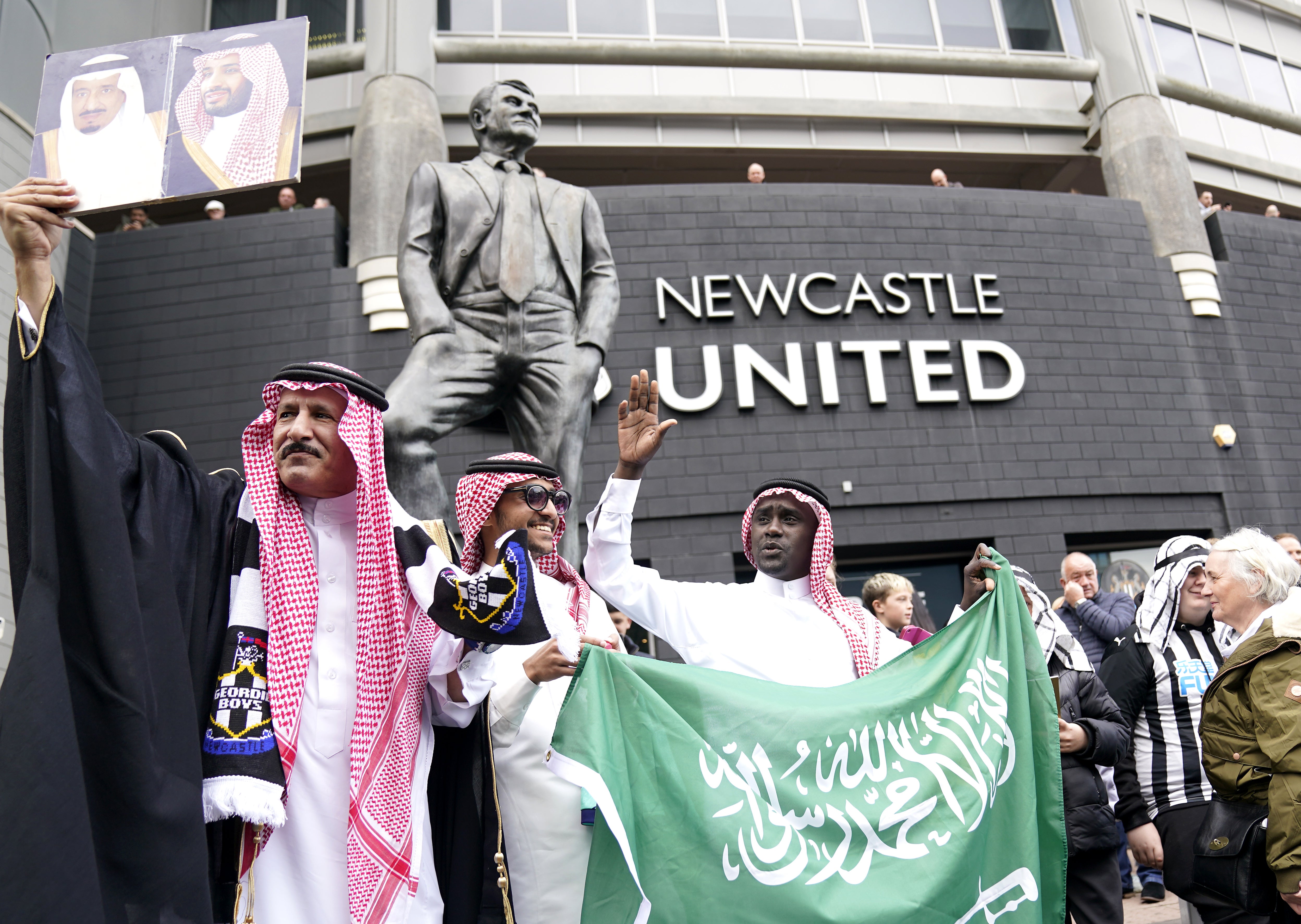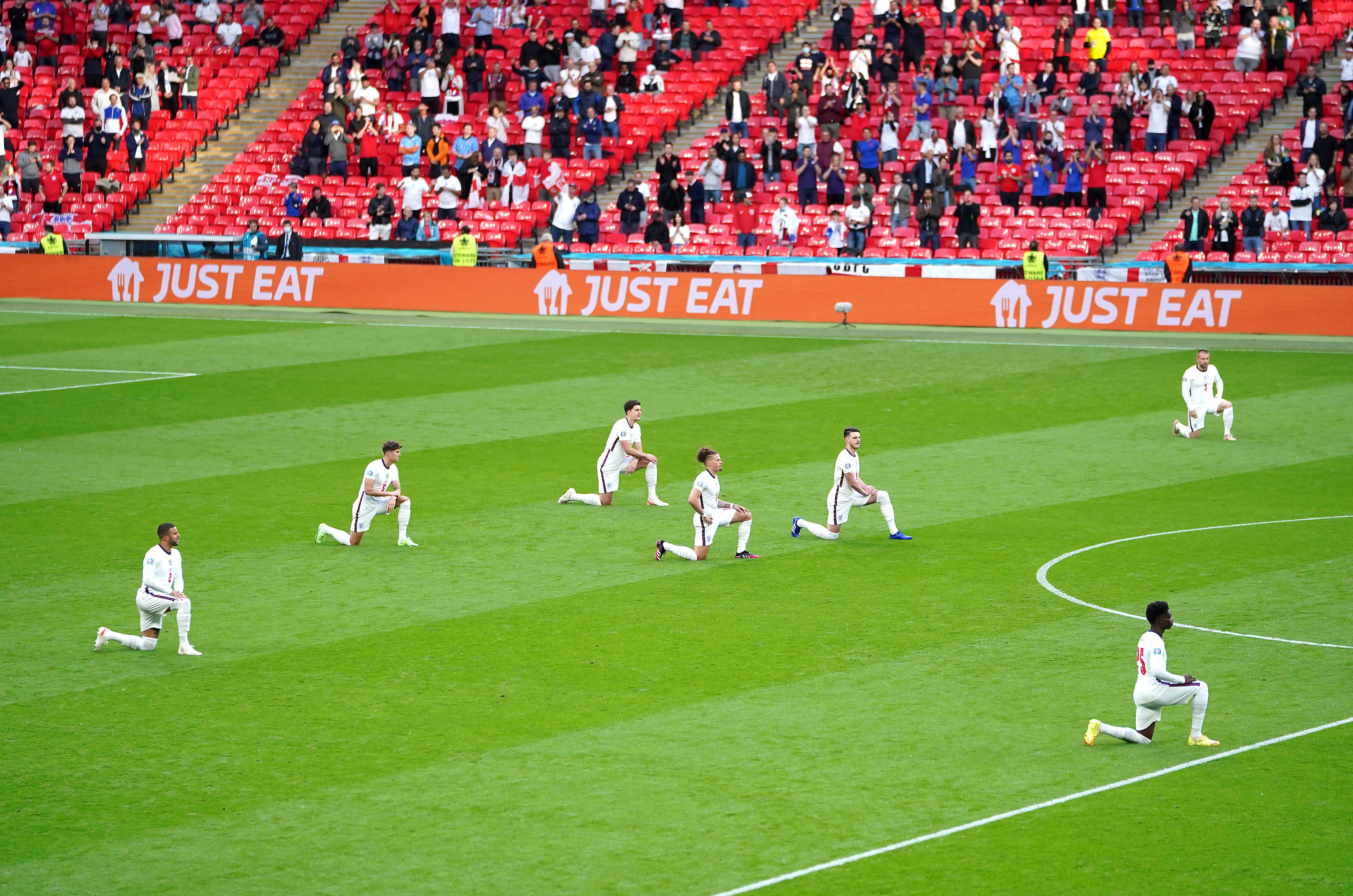2021 was the year football’s mask finally slipped
The European Super League breakaway, a state buying a Premier League club, racism in the stands and an anti-vaccine crisis were all part of a year the game would like to forget, writes Miguel Delaney


The football image of 2021 should have been crowds coming together again at a full Wembley, but the feel was instead of the game being pulled apart to a greater degree than ever before. It was, in so many ways, the year the mask slipped.
The naked greed of the Super League plan threatened to change the face of the sport, before Lionel Messi agreed to become a face of Qatar. Saudi Arabia finally succeeded in taking over Newcastle United, and so many Premier League players hid their faces in refusing to take the vaccine. Even one of the positives, which was England’s socially conscious squad reaching the Euro 2020 final, was spoiled by the crowd issues at Wembley.
This was football in 2021. The year was constantly complicated by notes of concern, by self-interest, despite the uplifting show of communal power that came with the collective response to the Super League. That now looks like it will be a squandered opportunity, or – in the words of one source – “a football Arab Spring”.
It might well be said that the game will never know anything like those three days between 18 and 21 April, but that is probably only true as regards the initial shock of the announcement, and the sheer intensity of the period. The reality is that all of the issues that led to the Super League remain. Even worse, the worry is that a groundwork has been laid. That goes beyond the legal case taken against Uefa by Real Madrid, Barcelona and Juventus.
The Super League happened because a core of clubs had been allowed to grow to such a financial size that too many of their games were too small for their ambitions, and because they had to try and keep pace with the state owners – at that point just Abu Dhabi and Qatar – who saw the political benefits of such power. None of that has gone away. It has only got worse.
It is somewhat ironic that a lack of mobility for clubs was one of the main reservations with the Super League, because this is already a problem hardwired into the sport. It really is the national game in this regard, because it reflects the UK in 2021.
A football season that was supposed to be made unpredictable by the effects of Covid still saw Manchester City coast to the league title, with 2022 looking like it might be similar. It is no coincidence that they, Liverpool and Chelsea remain out in front. The situation similarly illustrated how the wealthiest clubs so quickly self-correct.
Chelsea sacked Frank Lampard to still get back into the Champions League while winning the trophy, with Manchester United eventually following by ending the emotional experiment that was Ole Gunnar Solskjaer’s tenure. Thomas Tuchel's success emphasises how previous poor calls don't have that much football cost if you are wealthy enough. It isn’t impossible that United follow Chelsea by winning the Champions League this season. Certainly, nobody would be surprised if it was another all-English final.
The only potential challengers right now are Bayern Munich, who are fully on course for their 10th – tenth! – successive Bundesliga, and Paris Saint-Germain. The French club somehow lost their own league to Lille, in something close to a modern football miracle, but responded with a transfer window that was outlandish even by modern standards. It culminated in the purchase of perhaps the greatest player of all time, bringing to a head one of the biggest football ransackings of all time.
The number that PSG have done on Camp Nou is itself instructive; the fall of Barcelona a modern football fable.
The Independent was told as far back as 2017 that the Neymar transfer was not just about a show of power in signing one of the world’s greatest players from a rival. It was a show of power over the entire market, to reshape it. Influential figures at PSG calculated that if they flooded the game with so much money in terms of transfer fees and wages, only a handful of clubs would be able to compete, and many would bankrupt themselves trying to keep up.
This is the Barcelona situation summed up. That famous 6-1 comeback in 2017 proved the ultimate Pyrrhic victory, that also ensured a certain narrative symmetry in PSG's easy evisceration of the Catalan club last season. Kylian Mbappe’s hat-trick was another step on his rise to becoming the next best player in the world.

As regards the last best player in the world, the entire tie was just one more step in Messi’s departure from Barcelona. This was another absurdity of modern football laid bare. Barcelona had spent so much money trying to keep up, that they couldn’t keep the player who they valued more than any other. Messi meanwhile had little option himself at that market value, and was almost funnelled into choosing one of the state-owned clubs. This is the modern game. This is a vision of the future.
This shouldn’t be to absolve Barcelona, though. They had done as much as anyone in forcing the conditions where the game constantly favoured the big clubs, in their own country and in Europe, only for those conditions to attract bigger powers. Barcelona were so big they couldn’t fail, until they became so big they had to fall. This is why people talk of the game that is eating itself.
It is constantly being hollowed out by those at the top. The Premier League’s October broadcasting deal could meanwhile ensure that the competition hollows out the rest of western Europe, in the way western Europe has done to the rest of the sport. Very few can compete with that financial power.
This only emphasises how the problems of the Super League haven’t gone away. They have just been moved. It is even possible that this will only further push the rest of Europe towards their own Super League, to create a competition big enough to compete with England.
The Premier League now lies at the top of an increasingly stratified game, punctuated by gaps. MP Tracey Crouch’s fan-led review might have represented a chance to redress this, but it was a disappointingly flimsy document.
It is actually remarkable, in hindsight. The ructions caused by the Super League ensured the game had a mandate – and a rare opening – to draw up a sustainable blueprint for its future, but this was nothing of the sort. It offered some admittedly good measures, but superficial ones, that should really have been sidenotes to real substance regarding redistribution of resources.
There was none of that, nor was there any mention at all of state ownership despite that being one of the most pressing issues in the game.
The review didn’t feature a single mention of Saudi Arabia owning Newcastle or Abu Dhabi owning Manchester City. Crouch herself illustrated an ignorance of the Newcastle situation when asked about it, reasserting that she didn’t know the details. This, to quote one well-connected source, was “why she was put in charge”. The response was as lacking as the Premier League's explanation for finally accepting the Newcastle takeover. The phrase "legally binding assurances", which was used to try and explain away the fantasy that PIF is separate to the Saudi Arabian state, is a flimsy mask in itself.

It all leaves a game where, lamentably, any clubs outside the elite need a state takeover to even compete. Even a historic FA Cup win for Leicester City felt wondrous. That is despite the fact the club is now several financial levels up from 2016, and one of the wealthiest in the world. This is the same football world that has seen so many clubs enter into questionable relationships with cryptocurrency companies.
It is telling that the international game, so often maligned, offered such a joyous break from all this.
Euro 2020 saw no problematic takeovers, no transfer sagas like Harry Kane’s and no obscene spending of money. It instead saw what could almost be considered a purer level of football, where managers had to coach their available squads, with that giving rise to one of the most raucously entertaining tournaments in modern history.
The four days of the last 16 – especially those two featuring Spain 5 Croatia 3, Switzerland 3 France 3 and England’s 2-0 win over Germany – represented the uplifting opposite to the four days of the Super League. It was just pure football, played to its limits.
Even the defensive reputation of the international game evaporated, as the majority of teams adopted attacking approaches.
This is one positive that should be noted among so many negatives. For all the problems in football off the pitch, it has never been healthier on it. Players, managers and teams continue to push the boundaries of the game. Those who play within themselves, or seek to just defend, are generally pushed to the margins. This was maybe best exemplified by the Premier League’s most high-profile managerial changes, as Tottenham Hotspur upgraded on Jose Mourinho and Nuno Espirito Santo with Antonio Conte, and Solskjaer and Lampard were finally removed.
It is also part of the elite game’s great seduction that is its very wealth – that problematic concentration of resources – that makes such excellence more possible. It at least inspires others to follow, which is what happened in the international game.
The England players also proved inspirational in grander ways. Their social consciousness ensured even the country’s first run to a final since 1966 had a more profound significance. They played their part in uniting a population, at least to some degree.

It is remarkable now to think that England players taking the knee was once part of the culture war and booed. The very fact you don’t even hear such resistance any more is perhaps their greatest success. It proves at least some minds have been changed.
But what happened to even the euphoria of Euro 2020? It dissipated amid the crowd disturbance of Wembley. And what next? The disgrace of a Qatar World Cup, that is now accompanied by discussion about biennial tournaments largely driven by greed. This was football in 2021 but will also be football in 2022.
It is almost fitting, if sad, that the year ends with a debate over circuit-breakers and how many players refuse to take the Covid vaccine.
It still feels like a reckoning, or a material change to the structure of the sport, is on its way. This almost happened in 2021. It may end up just serving as a juncture year.
And yet it still had so many landmark football moments. The game itself remains beautiful, and invigorating. This is why we watch. This should be the true face. That shouldn’t require a mask.
Join our commenting forum
Join thought-provoking conversations, follow other Independent readers and see their replies
Comments